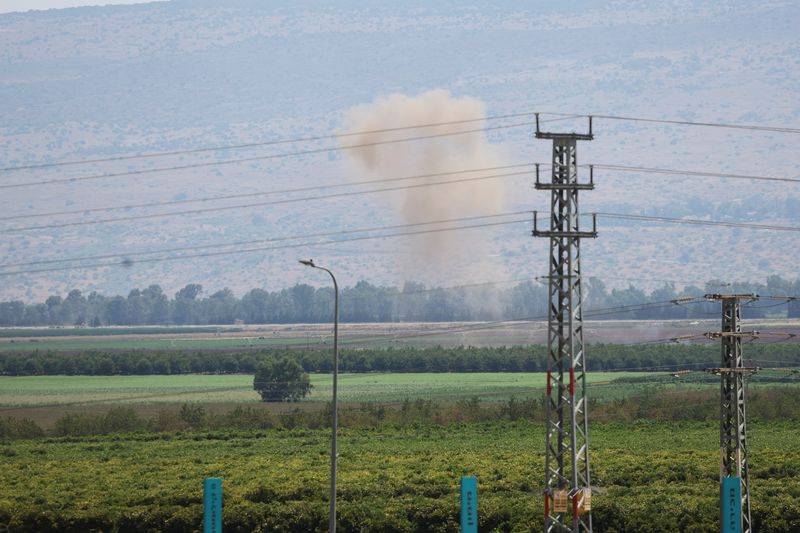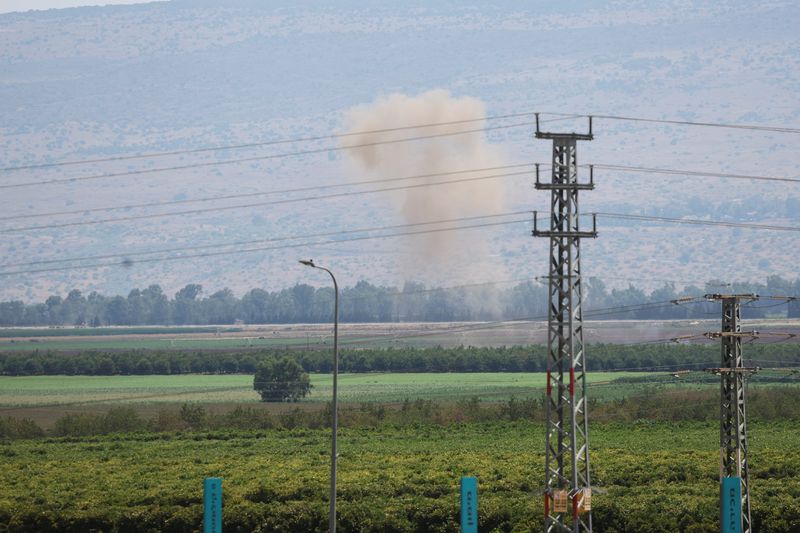Stock Markets
Israel sends delegation to negotiate hostage release deal with Hamas

By Nidal al-Mughrabi, Mohammad Salem and Maayan Lubell
CAIRO/GAZA/JERUSALEM (Reuters) -Israeli Prime Minister Benjamin Netanyahu told U.S. President Joe Biden on Thursday he has decided to send a delegation to resume stalled negotiations on a hostage release deal with Hamas, their administrations said.
In a phone call between the two leaders, Netanyahu repeated his position that Israel would only end its nearly nine-month war in Gaza when all its objectives had been achieved, his office said in a statement.
Israel’s Channel 12 said the head of Israel’s Mossad intelligence agency would lead the Israeli delegation for the talks, though this was not immediately confirmed.
Netanyahu is scheduled later on Thursday to have consultations with his negotiating team, then discuss the hostage release talks with his security cabinet.
The White House said the two leaders discussed the recent response received from Hamas.
“The president welcomed the prime minister’s decision to authorize his negotiators to engage with U.S., Qatari, and Egyptian mediators in an effort to close out the deal,” it said in a statement.
It was not clear where the Israeli delegation would go to resume the talks. Prior efforts to end the Gaza conflict were mediated by Egypt and Qatar, with talks held in both locations.
Israel received Hamas’ response on Wednesday to a proposal made public at the end of May by Biden that would include the release of about 120 hostages held in Gaza and a ceasefire in the Palestinian enclave.
A Palestinian official close to the mediation effort told Reuters that Hamas, the militant group that controls Gaza, has shown flexibility over some clauses that would allow a framework agreement to be reached should Israel approve.
Two Hamas officials did not immediately respond to requests for comment. Hamas has said any deal must end the war and bring a full Israeli withdrawal from Gaza. Israel maintains it will accept only temporary pauses in the fighting until Hamas is eradicated.
The plan entails the gradual release of Israeli hostages still being held in Gaza and the pullback of Israeli forces over the first two phases, and the freeing of Palestinian prisoners. The third phase involves the reconstruction of the war-shattered territory and return of the remains of deceased hostages.
‘ENOUGH IS ENOUGH’
In Gaza, Palestinians reacted cautiously ahead of Israel’s response.
“We hope that this is the end of the war, we are exhausted and we can’t stand more setbacks and disappointments,” said Youssef, a father-of-two, now displaced in Khan Younis, in the south of the enclave.
“Every more hour into this war, more people die, and more houses get destroyed, so enough is enough. I say this to my leaders, to Israel and the world,” he told Reuters via a chat app.
On Thursday, Gaza’s health ministry said the Palestinian death toll in the nearly nine months of war had passed 38,000, with 87,445 wounded. The health ministry does not distinguish between civilians and fighters in its figures.
The war in Gaza began when Hamas-led gunmen burst into southern Israel on Oct. 7, killed 1,200 people and took around 250 hostages back into Gaza, according to Israeli tallies.
An Israeli strike hit a school in Gaza City and the Civil Emergency Service said five Palestinians were killed and others wounded, while other Israeli strikes on Gaza City’s old town on Thursday killed a woman and wounded several others, medics said.
The Israeli military said it had been operating to dismantle Hamas’ military and administrative capabilities. It said it was acting in accordance with international law and taking feasible precautions to minimise civilian casualties.
Israeli tanks also shelled several areas on the eastern side of Khan Younis after the army issued evacuation orders on Tuesday, but there has been no movement by the tanks into those areas, residents said.
SEEKING SHELTER
On Thursday, many Palestinians were still seeking shelter following the evacuation orders, which also included the border city of Rafah and which the United Nations said was the largest such edict since 1.1 million people were told to leave the north of the enclave in October.
Khan Younis residents said many families slept on the road because they could not find tents.
Israeli planes and tanks bombed several areas in the northern Gaza areas of Shejaia, Sabra, Daraj and Tuffah, killing several Palestinians, including children, and wounding others, health officials said.
The Israeli military said its troops and aircraft killed dozens of militants in those areas and in Rafah, in southern Gaza, which Israel has described as Hamas’ last stronghold.
Israel’s leaders have said they are winding down the phase of intense fighting against Hamas and would soon move to more targeted operations.
However, after months of conflict Hamas still claims to have munitions to fight back. On Thursday, Hamas’ armed wing said it had targeted the Israeli operations command headquarters east of Gaza City with missiles.
The group also claimed that its militants were able to fire a Soviet-built anti-aircraft missile towards an Apache helicopter in the sky over the Shejaia neighbourhood, east of Gaza City, without saying if it had been hit.
Israel did not comment on the claims.

The war has created a humanitarian crisis and destroyed the majority of the enclave’s medical facilities.
On Thursday, the Gaza health ministry said generators at the Nasser Medical Complex in Khan Younis, the only main hospital still functioning, would run out of fuel within hours and appealed to international humanitarian organisations for help to secure fresh supplies.
Stock Markets
Suburban Propane director Logan sells $139k in shares
Stock Markets
Stock market today: S&P 500 closes lower, but posts big weekly win
Stock Markets
TD Bank promotes Laura Nitti to retail market president role

 Forex3 years ago
Forex3 years agoForex Today: the dollar is gaining strength amid gloomy sentiment at the start of the Fed’s week

 Forex3 years ago
Forex3 years agoUnbiased review of Pocket Option broker

 Forex3 years ago
Forex3 years agoDollar to pound sterling exchange rate today: Pound plummeted to its lowest since 1985

 Forex3 years ago
Forex3 years agoHow is the Australian dollar doing today?

 Cryptocurrency3 years ago
Cryptocurrency3 years agoWhat happened in the crypto market – current events today

 World3 years ago
World3 years agoWhy are modern video games an art form?

 Commodities3 years ago
Commodities3 years agoCopper continues to fall in price on expectations of lower demand in China

 Economy3 years ago
Economy3 years agoCrude oil tankers double in price due to EU anti-Russian sanctions





















